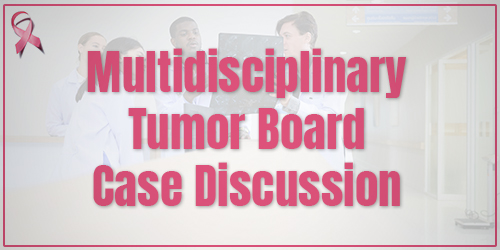Decisions regarding patient care require careful consideration of various factors, including disease stage, treatment options, and patient preferences. Multidisciplinary tumor board case discussions offer a collaborative approach to decision-making. It brings together a diverse team of healthcare professionals to review individual patient cases and formulate comprehensive treatment plans. This page explores the significance of multidisciplinary tumor boards and their impact on improving patient outcomes.
Understanding Multidisciplinary Tumor Boards
A multidisciplinary tumor board is a forum where experts from different medical specialties, including oncologists, surgeons, radiologists, pathologists, and other allied healthcare professionals, convene to discuss and evaluate individual cancer cases. These discussions involve a thorough review of the patient's medical history, diagnostic tests, imaging studies, pathology results, and treatment options. By pooling together diverse expertise and perspectives, tumor boards aim to optimize treatment decisions and provide personalized care tailored to each patient's unique needs.
Key Components of Multidisciplinary Tumor Board Case Discussions
Below are some key components of multidisciplinary tumor board case discussions:-
- Comprehensive Case Review
Tumor board discussions begin with a comprehensive review of the patient's medical records, including diagnostic tests, imaging studies, and pathology reports. This allows the team to gain a thorough understanding of the patient's disease status and treatment history.
- Interdisciplinary Collaboration
The hallmark of tumor board discussions is interdisciplinary collaboration, where experts from different specialties contribute their insights and expertise to formulate a cohesive treatment plan. This collaborative approach ensures that all aspects of patient care, including medical, surgical, and supportive interventions, are carefully considered.
- Evidence-Based Decision-Making
Tumor board discussions are guided by evidence-based practice, with treatment recommendations grounded in the latest scientific evidence, clinical guidelines, and best practices. This ensures that patients receive the most effective and appropriate care based on the latest advancements in cancer research.
- Patient-Centered Care
Central to tumor board discussions is a focus on patient-centered care, where treatment decisions are made in partnership with patients and their families. Patient preferences, values, and goals are carefully considered, allowing for shared decision-making and informed consent.
Benefits of Multidisciplinary Tumor Board Case Discussions
Here are the benefits of multidisciplinary tumor board case discussions:-
- Optimized Treatment Planning: Tumor board discussions facilitate comprehensive evaluation of treatment options, ensuring that patients receive individualized care tailored to their specific disease characteristics and personal preferences.
- Enhanced Clinical Outcomes: By harnessing the collective expertise of multidisciplinary teams, tumor board discussions lead to more informed and evidence-based treatment decisions, resulting in improved clinical outcomes and survival rates for cancer patients.
- Reduced Variability in Care: Tumor boards help standardize treatment approaches and reduce variability in care by ensuring that decisions are guided by consensus among experts from different specialties.
- Improved Communication and Coordination: Tumor board discussions promote effective communication and coordination among healthcare providers, fostering seamless transitions between different phases of cancer care and optimizing patient management.
- Educational Opportunities: Tumor board discussions serve as valuable educational forums, providing opportunities for professional development, peer learning, and knowledge exchange among healthcare professionals.
Conclusion
Multidisciplinary tumor board case discussions play a pivotal role in enhancing the quality and effectiveness of cancer care through interdisciplinary collaboration, evidence-based decision-making, and patient-centered approaches. By harnessing the collective expertise of multidisciplinary teams, tumor boards optimize treatment planning, improve clinical outcomes, and ensure that patients receive comprehensive, personalized care tailored to their unique needs. As an integral component of modern oncology practice, multidisciplinary tumor boards exemplify the power of collaborative teamwork in the fight against cancer.














